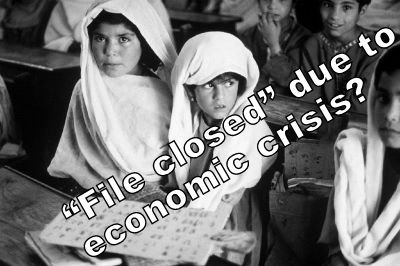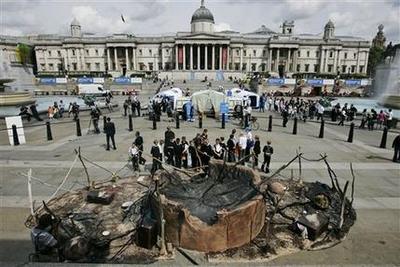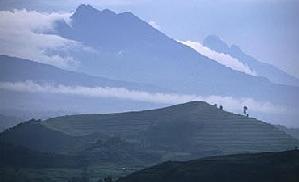News: After the global financial crisis comes the global humanitarian crisis?

“The budget should be balanced, the Treasury should be refilled,
public debt should be reduced, the arrogance of officialdom should be tempered and controlled, and the assistance to foreign lands should be curtailed lest Rome become bankrupt.”
Cicero, 55 BC
public debt should be reduced, the arrogance of officialdom should be tempered and controlled, and the assistance to foreign lands should be curtailed lest Rome become bankrupt.”
Cicero, 55 BC
What is the plural of "crisis"?
It seems like 2008 is becoming the year of global crisis. First we were faced with the worldwide food crisis, swiftly followed by, what now seems to be, a collapse of major financial institutions.
But it might not stop here. As FAO, the UN Food and Agriculture Organisation, calculated the cost to deal with the current food crisis at US$30 billion per year, donors stepped up their financial support.
But that was before the current financial crisis. At this moment, the governments worldwide concentrate their financial resources in keeping their banks and financial institutions afloat:
- The Belgian, French and Luxembourg governments put in US$9 billion to keep Dexia afloat. (Full)
- Previously Netherlands, Belgium and Luxembourg put up US$16.1 billion to save the Fortis bank. (Full)
- Britain is working on a US$87.7 billion bank recapitalization concentrating on Barclays, HSBC and the Bank of Scotland (Full)
- Spain announced a US$40.9 billion fund to buy up bank assets and maintain liquidity (Full)
- Sweden is given Iceland's biggest bank, Kaupthing, an emergency loan worth up US$702 million) to help keep it afloat. (Full)
- Germany has thrown a US$50 billion lifeline to struggling lender Hypo Real Estate. (Full)
- Italy is about to set up a rescue fund close to US$30 billion for the banking industry. (Full)
- Canada gave a US$25 billion "backstop" for there banks. (Full)
- Russia pledged to boost liquidity by more than US$100bn (Full), on top of a US$5.4 billion loan to Iceland (Full)
- And of course we all know about the $700 billion monster US bailout (Full)
Any money left for international aid?
The end balance? During the food crisis, donor countries already stepped up their extra-budgetary funds to come to the rescue of aid organisations "on the occasion of the raising food prices", but now are faced with the massive cash drain bailing out their own financial institutions.
At the same time, poor countries in Africa, Asia and Latin America, which are already dealing with a surge in food and energy prices, are now finding it harder to sell goods abroad and encourage investment in their own economies. (Full)
The question now is: how much money will be left for international aid?
This week, amidst the financial turmoil, world leaders met to review the progress of the UN Millennium Development Goals (MDGs). These are intended to reduce extreme global poverty and, improve health and education.
It was stressed that development aid needed to increase by $18 billion each year towards fulfilling the goals. At the end of the event, UN Secretary General Ban Ki-moon announced that an additional US$16 billion had been pledged by governments to meet the targets of the MDGs. British Prime Minister Gordon Brown in his address to the UN, went on to say that the financial crisis should not be an excuse to cut aid. (Full)
The "Humanitarian Doomsday scenario" - the first signs
Many of us, in the aid organisations, are not that optimistic as UN Secretary General Ban Ki-Moon:
Journalist Andrew Stroehlein, the Director of Media and Information for the International Crisis Group, states it bluntly: "I might as well just pack up and go on holiday for a few months. With the global financial crisis continuing, no one wants to hear about violent conflict and mass atrocities around the world". (Full)
UNHCR, the UN Refugee Agency, just wrapped up its annual refugee conference and it is concerned its needs may not be met because of the global financial crisis. (Full)
"The financial turmoil rippling across the globe will set back efforts to fight climate change, drying up capital that could help poorer countries upgrade to clean energy technology", said Yvo de Boer, the executive secretary of the U.N. climate secretariat, adding: "You can't pick an empty pocket". (Full)
Will the global financial crisis also cause a global humanitarian crisis? Time will tell, but it looks like it. As history showed, the poorest of the world always pick the shortest straw.
Update Oct 15: Aid agencies say world's poorest will be biggest victims of world's financial crisis
More posts on The Road about the food crisis, poverty, development, the UN and the economy.
Original picture courtesy Susan Manuel (WFP) Read the full post...







 Peter. Flemish, European, aid worker, expeditioner, sailor, traveller, husband, father, friend, nutcase. Not necessarily in that order.
Peter. Flemish, European, aid worker, expeditioner, sailor, traveller, husband, father, friend, nutcase. Not necessarily in that order.
The Road's Dashboard
Log in
New
Edit
Customize
Dashboard